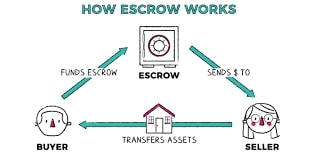Do I need an Escrow Account?

Do I really need to open an escrow account in Mexico? That is a question we receive frequently. Here is what you need to know about escrow in Mexico.
An escrow is a legally binding arrangement where a third party holds assets from a buyer and seller during the sales process until a transaction is complete. While escrow can be used for various purposes, from online purchases to home buying, the most common use is to ensure fair real estate agreements. The escrow company or agent is a third party who has no conflict of interest, ensuring a fair and smooth agreement. Here, we will go over escrow, how it works, the different types, and the pros and cons. In Mexico it is NOT offered unless you specifically request one, so make sure you do when doing any kind of transaction here.
When do you need to open an escrow account?
This third-party system does come with management fees and certain stipulations, but in some cases, it may be the best option to ensure a sound transaction.
Escrow accounts can provide a useful means to manage payment risk in a variety of situations concerning the leasing and purchase of the commercial real estate. These include:
- Acting as a source of security for rent default
- A means to collateralize development/maintenance obligations
- Acting as security to a real estate purchase
Continued pandemic-related uncertainty in the commercial real estate market could be reflected in an increase in requests for sub-leasing, rent holidays, waivers of development obligations, and a general return to the negotiating table for landlords and their chain of tenants and under-tenants.
Wherever those discussions occur, escrow accounts can provide meaningful collateral and security, as well as robust protection against payment and counter-party risk.
The USA PATRIOT Act, and in Mexico the Anti-Laundering Law. requires all financial institutions to obtain, verify and record information that identifies each person who opens any type of account within a financial institution.
What is escrow?
Escrow is a legal concept describing a financial instrument whereby an asset or escrow money is held by a third party on behalf of two other parties that are in the process of completing a transaction. Escrow is mainly associated with real estate transactions, though it can also apply to other situations where funds pass from one party to another, such as mergers and acquisitions or securities.
In the context of buying and selling property, these accounts are usually maintained by real estate agents, brokers, and other fiduciaries, and are designed to hold funds for the protection and proper disbursement after certain obligations have been fulfilled.
During the sale of a house, for example, the buyer and seller may agree to use escrow, and the buyer would deposit the amount due in the established account managed by, or in the custody of, an agent. This guarantees the seller that the buyer is able to make the payment.
Once all the conditions for the sale have been met, the agent transfers the money to the seller and the title to the property is passed onto the buyer. This approach guarantees that the buyer has the funds needed for the purchase and that the money will be handed over once the title is transferred, thereby ensuring trust between the two parties.
Real Estate Escrow
Escrow agreements are a bit more complex when selling or purchasing a home. With so many stages of the mortgage loan approval, home inspection, and deed transfer, escrow help streamline the process for all involved parties, especially in Mexico.
Once a seller accepts the buyer’s offer, a lender will write up a purchase agreement that outlines details of the escrow. They will then gather the down payment from the seller, the loan amount, and all additional non-recurring closing costs to complete the sale. When both parties close on the home, the lender transfers the cost of the home to the seller.
This process protects each party from fraud or sudden financial changes. If the home does not pass inspection or previously unknown information appears about the buyer’s financial history, there are still ways to stop the sale.


